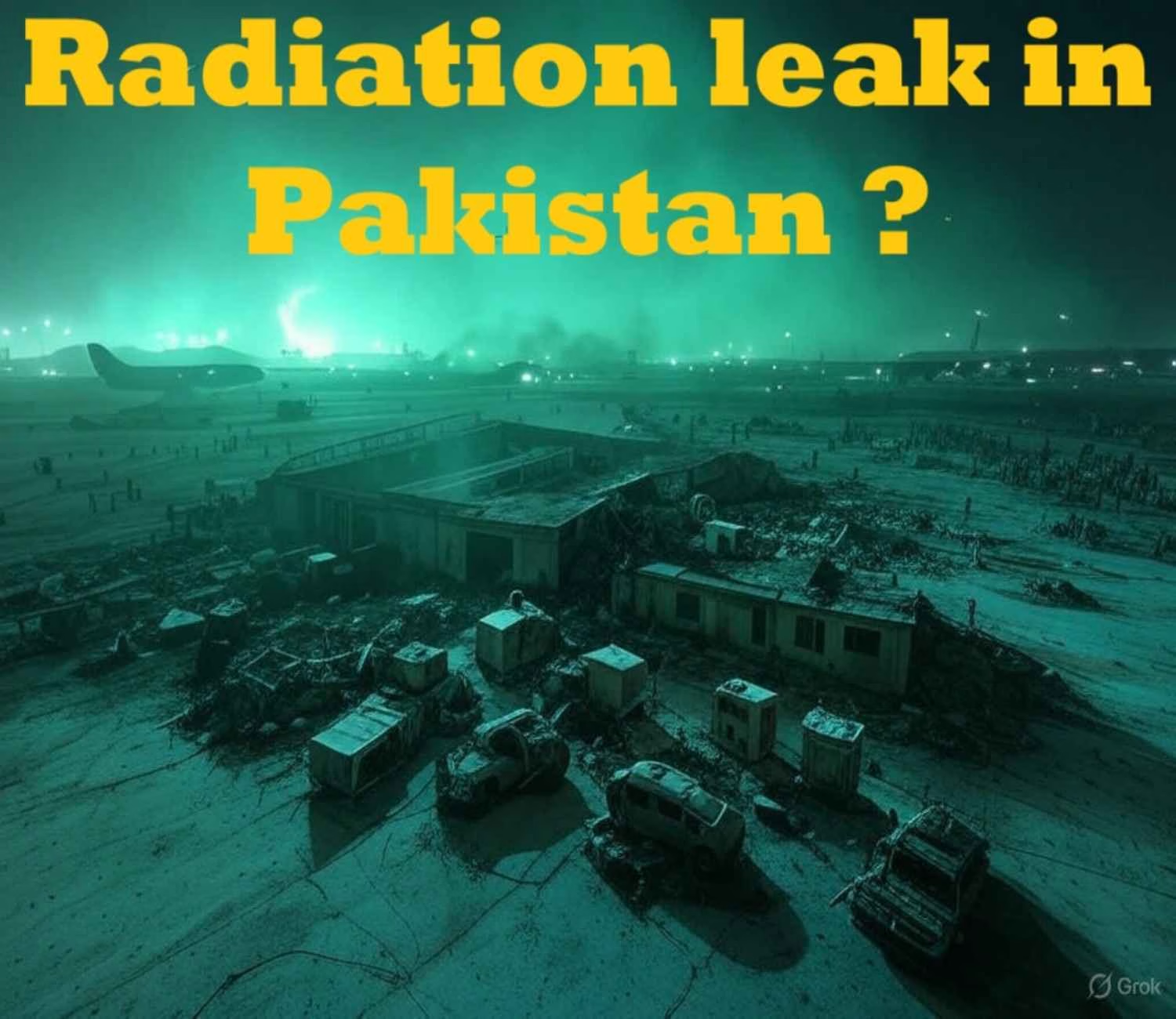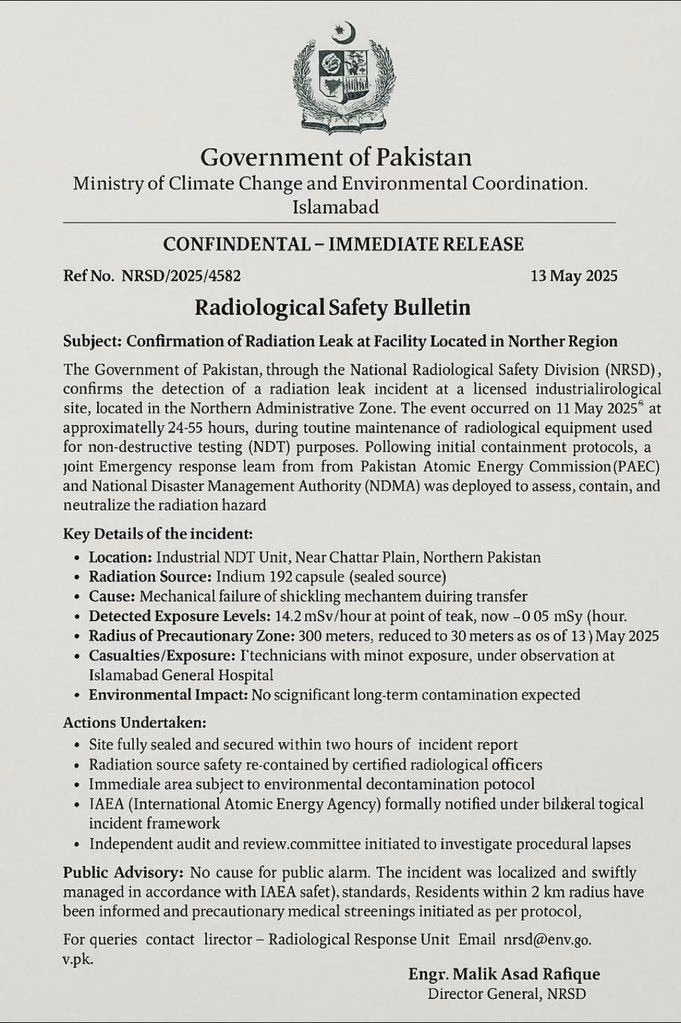
India Prime | International Desk | Radiation Leak in Pakistan I Widespread speculations and social media claims regarding a potential radiation leak in Pakistan have surfaced, particularly following India’s recent military operation, Operation Sindoor, which targeted several Pakistani airbases. These claims are driven by unverified reports, alleged flight data, and a purported “Radiological Safety Bulletin” from the Pakistani government. However, as of May 13, 2025, no credible confirmation of a radiation leak has been provided by Pakistani or international authorities. Below is a detailed breakdown of the situation:

Has There Been a Radiation Leak in Pakistan? Facts and Rumors
Radiation Leak at Kirana Hills or Nur Khan Airbase
- Social media posts and some news outlets claimed that Indian airstrikes during Operation Sindoor (May 6–10, 2025) damaged a nuclear facility at Kirana Hills (near Sargodha) or Nur Khan Airbase (Rawalpindi), leading to a radiation leak.
- Kirana Hills is rumored to house Pakistan’s nuclear storage facilities, and Nur Khan Airbase is close to Pakistan’s Strategic Plans Division, which manages its nuclear arsenal.
- Posts on X claimed that civilians near these sites experienced symptoms like nausea, vomiting, and headaches, suggesting radiation exposure.
Involvement of US and Egyptian Aircraft
- Based on Flightradar24 data, claims emerged that a US Department of Energy Beechcraft B350 AMS aircraft (used for nuclear emergency response) was spotted in Pakistani airspace, fueling speculation of a radiation leak.
- It was also alleged that an Egyptian Air Force cargo plane delivered boron (used to suppress radiation) to Pakistan, further amplifying theories of a nuclear incident.
Alleged Radiological Safety Bulletin
- A document titled “Radiological Safety Bulletin,” supposedly issued by Pakistan’s Ministry of Climate Change and Environmental Coordination on May 13, 2025, claimed a radiation leak in Northern Pakistan due to a mechanical failure involving an Indium-192 capsule used for non-destructive testing.
- This document was widely shared online but has been debunked as fake by fact-checking organizations like Newschecker, citing errors in the document and the absence of credible official confirmation. The Pakistan Nuclear Regulatory Authority (PNRA), not the mentioned National Radiological Safety Division (NRSD), is the relevant regulatory body.
Official Denials and Clarifications
Indian Statements:
- Indian Air Force Air Marshal A.K. Bharti explicitly denied targeting Kirana Hills or any nuclear facility. He stated, “We have not hit Kirana Hills or whatever is there,” and clarified that India targeted only military and terrorist infrastructure, such as Sargodha and Nur Khan airbases.
- Indian Ministry of External Affairs spokesperson Randhir Jaiswal reiterated that military actions were focused solely on terrorist and military targets, not nuclear facilities.
Pakistani Response:
- The Pakistani government and military have not officially confirmed any radiation leak. Foreign Minister Ishaq Dar, in a CNN interview, stated that Pakistan did not consider deploying nuclear warheads during the conflict and focused on conventional strikes in “self-defense.”
- The Pakistani military has remained silent on radiation leak allegations, despite social media claims of civilian health issues.
International Perspective:
- Neither the US, Egypt, nor international nuclear regulatory bodies like the IAEA have confirmed a radiological emergency in Pakistan. The presence of the B350 AMS aircraft has not been verified by US officials, and some analysts suggest it could be a Pakistani military aircraft misidentified as American.
- No reports of widespread medical emergencies indicative of a high-level radiation leak have been confirmed in Pakistan.
Conflict Context
- India-Pakistan tensions escalated after a terrorist attack in Pahalgam, Kashmir, on April 22, 2025, which killed 26 people. India attributed the attack to Pakistan-backed groups like The Resistance Front (TRF) and Lashkar-e-Taiba (LeT).
- India launched Operation Sindoor on May 6, targeting Pakistani airbases like Sargodha, Nur Khan, Rafiqui, and Jacobabad, as well as radar sites, with missiles and airstrikes, causing significant damage.
- Pakistan retaliated with strikes on Indian military bases, leading to a fragile ceasefire brokered on May 10, 2025, reportedly with US mediation.
- Speculation about nuclear risks intensified due to Pakistan’s emergency National Command Authority (NCA) meeting and the proximity of Indian strikes to sensitive sites like Sargodha (20 km from Kirana Hills) and Nur Khan (10 km from Islamabad).
Analysis of Claims
- Lack of Evidence: The radiation leak narrative is primarily based on unverified social media posts, a debunked document, and ambiguous flight data. No credible news outlet or official body has confirmed a nuclear incident.
- Risk of Misinformation: The timing of the alleged bulletin (post-ceasefire) and its errors suggest a disinformation campaign amid the India-Pakistan conflict. Similar fake documents have recently circulated, including false claims about former PM Imran Khan.
- Unsubstantiated Health Claims: Reports of civilian symptoms like nausea and headaches lack corroboration from hospitals, health authorities, or international observers.
- Flight Data Ambiguity: The B350 AMS aircraft’s presence is based on open-source flight tracking, but its purpose (if real) could range from routine monitoring to precautionary checks, not necessarily confirming a leak. The Egyptian boron shipment remains unconfirmed.
Current Status
- As of May 13, 2025, there is no confirmed evidence of a radiation leak in Pakistan. The situation remains speculative, driven by social media and unverified claims.
- The Indian Air Force and Ministry of External Affairs have denied targeting nuclear facilities, and Pakistan has not acknowledged any nuclear incident.
- The ceasefire between India and Pakistan holds, but tensions persist, with both sides accusing each other of violating the agreement.
Verification Recommendations
- Check statements from the Pakistan Nuclear Regulatory Authority (PNRA), the International Atomic Energy Agency (IAEA), or the US Department of Energy for updates on any radiological emergency.
- Rely on credible news sources (e.g., BBC, Reuters, Al Jazeera) rather than social media or unverified documents.
- Be cautious of disinformation during India-Pakistan tensions, as fake documents and exaggerated claims are common.
Benefits of Spreading Rumors
- Strategic Pressure: Rumors can create psychological pressure during India-Pakistan tensions. Accusing India of targeting nuclear facilities can draw international attention, increasing diplomatic pressure on India.
- Social Media Influence: Sensational rumors can go viral on social media, boosting the reach and influence of certain individuals or groups, enhancing their online presence.
- Military Confusion: During conflict, rumors can confuse the enemy. For instance, radiation leak rumors could instill fear in the Pakistani military or public, potentially disrupting their strategies.
Harms of Spreading Rumors
- Social Instability and Fear: Radiation leak rumors have caused fear among the Pakistani public. Social media claims of symptoms like nausea, headaches, and vomiting, though unverified, could lead to social unrest.
- Erosion of Trust: Repeated unverified claims can erode public trust in governments, militaries, and international organizations. Despite Pakistan’s silence and India’s denial, rumors have fueled confusion.
- Diplomatic Tensions: Rumors have worsened already strained India-Pakistan relations, necessitating international intervention (e.g., by the US), raising questions about regional stability.
- Risk of Disinformation: The alleged “Radiological Safety Bulletin” was debunked as fake by Newschecker, highlighting how such documents amplify disinformation, complicating the situation further.
Conclusion
The radiation leak rumors in Pakistan, particularly following India’s Operation Sindoor (May 6–10, 2025), have spread rapidly on social media and unverified sources, alleging a leak at Kirana Hills or Nur Khan Airbase due to Indian strikes. However, as of May 13, 2025, neither the Pakistan Nuclear Regulatory Authority (PNRA) nor the International Atomic Energy Agency (IAEA) has confirmed these claims. The Indian Air Force has also denied targeting Kirana Hills. While these rumors may offer strategic or social media benefits to some, they have caused significant harm by increasing fear, eroding trust, and exacerbating diplomatic tensions. Relying on verified sources is crucial to avoid the pitfalls of such misinformation.




One thought on “Radiation Leak in Pakistan? Facts and Rumors”